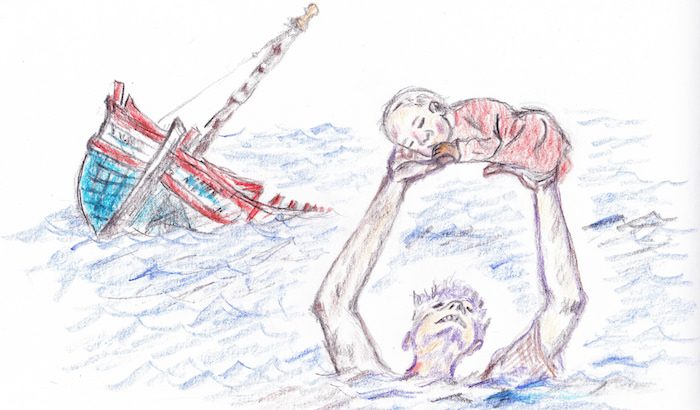
Refugees are in the frame, or are being framed, in a specific way – a way that objectifies them, disempowers them, and represents them as objects, rather than subjects, of danger. The discourse that frames them has a particular shape, a topology, and this topology is determined by and determines power relations – and that includes the power to present and the power of representation. So only a limited range of voices get to represent themselves, and the refugee has their representation determined for them.
But this discourse also has a topography – it can be mapped onto a political geography of the international order, and this political geography is also one of power relations.
By discourse here I mean not just media representations of refugees or the dominant political language used by those in power, but also political theory – so the whole framework is implicated in the maintenance of those power relations, and it is political theory in particular that I want to put in the frame.
A great deal of political theory about migration and membership is ‘insider theory’, assuming a specific perspective from inside a nation-state, such that migrants and refugees are structured as essentially outside the political order of things, and structured as a problem for that political order.
Focussing on the refugee in particular, we can see that the Refugee Question is structured as a problem that has to be solved in the interests of that political order, namely in the interests of the nation-state and its members. The refugee is structured as the object of that question, and a passive object with no agency and no voice.
What we need to do is to flip this perspective around and see the refugee as the active subject of the Refugee Question – that is both asking it and actively seeking an answer to it – and that the citizen of the nation-state be constructed as the problem, a problem that needs to be solved in the interests of the refugee.
And I do not suggest this simply as an interesting thought experiment, but as a political reality. The fact is that it is the rights of those who are already safe that are placing obstacles in the way of those struggling to escape danger.
I said that the discourse does not just have a topology – an inside of political order and an outside of political disorder which the refugee brings with them – but also a topography, a geographical shape. Looking at political theory again, the fact is that not only has theory been ‘insider’ theory, theorising from inside the nation-state, it also theorises from inside a particular kind of nation-state in a particular location – liberal democratic states in the Global North.
It structures a perspective on migration and membership centred on the interests of citizens of Global North liberal democracies. And so typically political theory structures its discussions of migration around a specific set of anxieties concerning the fate of liberal political culture.
This means that any solution to the Refugee Question framed within that discourse cannot be genuinely inclusive and egalitarian, because the negotiation on which that solution is based is not taking place on an equal basis. That negotiation will be between those on the inside, with refugees remaining on the outside of that process. They remain the passive objects of that negotiation, without a voice – and again that includes the process of political theorising.
And so the Refugee Question is structured in such a way that the refugee is ‘framed’ as the problem, as the passive object of the question with no voice in answering it. But the cleverest conjuring trick of this discourse is that, far from being the one in danger, the refugee represents danger, a threat to the political order, security and wellbeing of members of the liberal democratic state. Reality is flipped around.
We need to flip it back. That means, amongst many other things, ensuring that the refugee becomes the active subject of the Refugee Question rather than its passive object, and realising that this changes the question fundamentally such that the focus moves away from the rights of the refugee and focusses upon the privileges of the citizen of the liberal democratic state. In other words, the Refugee Question was never the right question to begin with.
The right question was always much bigger and much more challenging for members of Global North liberal democracies, because it makes them realise that if we ask the right question, it’s not the refugee who is the problem – they are. As I argued above, it is the rights of those who are already safe that place obstacles in the way of those struggling to escape danger, and it is those rights that need to be problematized.
Unless citizens of such states are willing to problematize their own position, their own power, their own safety, they have to accept that they are not willing to take the Refugee Question seriously.
This is a version of a talk delivered at the “Framing Migration” event organised by the Open University, University of Oxford’s Centre on Migration, Policy and Society, the Migration Museum Project, the International Organisation for Migration, and actREAL, which took place on November 21, 2016.
Further Reading on E-International Relations
- Empathy and Othering: Framing Syria’s Refugee Crisis in the British Press
- The Cartagena Declaration at 35 and Refugee Protection in Latin America
- Forced Migration and Security Threats to Syrian Refugee Women
- The European Union’s Response to the Syrian Refugee Crisis
- National Responses to the Syrian Refugee Crisis: The Cases of Libya and Malta
- The Critical Role of Turkey in the Management of the Syrian Refugee Crisis